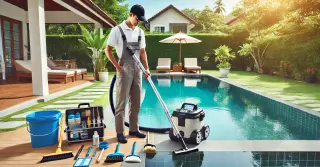Residential Pool Maintenance Edgewood MD

Effective residential pool upkeep begins with consistent cleaning and debris management. Keeping your pool free from dirt, leaves, and other debris is crucial for both appearance and hygiene.
- Surface Skimming and Pool Vacuuming: Regular skimming and vacuuming are vital tasks to ensure a debris-free pool. Use a pool skimmer to remove floating debris such as leaves and bugs, and vacuum the pool floor to eliminate dirt and sediment. This keeps the water clear and inhibits algae and bacteria.
- Scrubbing Pool Surfaces and Tiles: Don't forget to clean the pool walls and tiles frequently. Brushing the walls and cleaning tiles helps prevent the buildup of algae, calcium, and other residues. Use a pool-specific brush, whether it’s plaster, fiberglass, or vinyl, to avoid damage. Regular cleaning keeps your pool looking pristine and prolongs its life.
Maintaining Pool Water BalanceBalancing the water chemistry is essential for safe and enjoyable swimming. Proper chemical levels prevent algae growth, bacteria, and other contaminants, while also protecting your pool's structure and equipment.
- Consistent Chemical Testing and Balancing: Regularly test your pool water to track chemical levels, including pH, chlorine, alkalinity, and calcium hardness. Use a reliable pool test kit to get accurate readings. Adjust levels as necessary to maintain balance. Well-balanced water prevents corrosion, scaling, and cloudiness, providing a safe and enjoyable swim.
- Proper Pool Chemical Use: When handling pool chemicals, always adhere to manufacturer instructions and use appropriate safety gear, like gloves and goggles. Add chemicals in the correct order, and do not mix them directly, as this can lead to dangerous reactions. Store chemicals in a cool, dry place, away from children and pets. Using pool chemicals safely protects you and your family and maintains the quality of your pool water.
Consistent Equipment Checks and UpkeepRegular inspection and maintenance of pool equipment are crucial for efficient pool operation. This includes pumps, filters, heaters, and chlorinators, which all play key roles in keeping your pool clean and functional.
- Inspecting and Cleaning the Pool Pump and Filter: Consistently monitor your pool pump and filter to ensure they are working properly. Clean or replace filter cartridges as necessary for optimal filtration. A well-maintained pump and filter keep the water clear and free of contaminants, reducing the workload on your chemical treatments.
- Checking Heaters and Chlorinators: Verify that your pool heater and chlorinator are working properly. Inspect for any wear and tear, such as leaks, rust, or faulty parts. Routine maintenance and prompt repairs can prevent costly breakdowns and prolong equipment life. A properly functioning heater ensures comfortable water temperatures, while a working chlorinator maintains clean and sanitized water.
Home pool upkeep requires regular cleaning, water balance, and equipment care. By adhering to these practices, you can ensure a safe, clean, and inviting pool throughout the swimming season.




